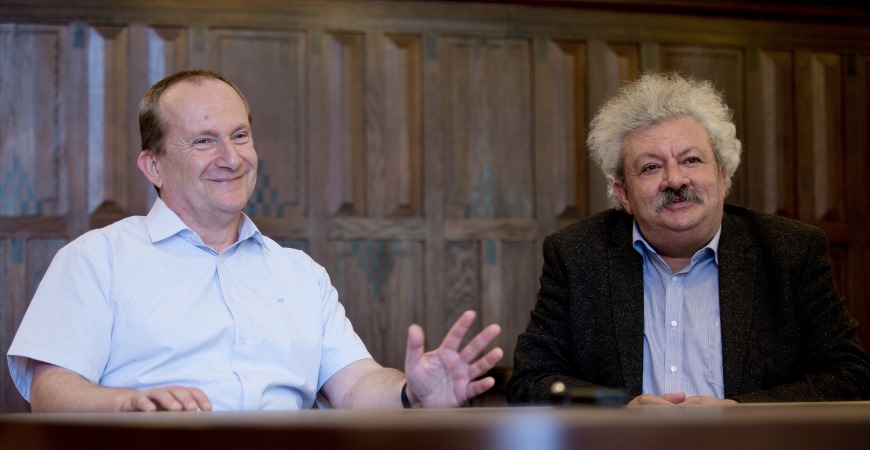Parity
We spoke with Salamon Kamp, conductor and member of the Doctoral Council of the university, as well as guitarist József Eötvös, head of the Strings Department, about PhD courses at the Liszt Academy, the interaction between performance art and culture, the hierarchy of instruments, and Bach’s timelessness.
Does the fact that you, as a guitarist, lead the work of the Liszt Academy’s internationally renowned Strings Department mean that the guitar – an instrument often underrated by non-professionals – has finally come of age?
József Eötvös: I consider it an honour, and at the same time I must say I have never felt that anybody within the profession underrates the instrument. I am fully aware that when it comes to the guitar, people on the whole think first of pop music. A certain segment of classical musicians retain reservations about the guitar genre. I think it is true that the literature of the classical guitar has not yet attained that level of complexity, of nuance and excitement that, let’s say, the piano, the violin or indeed the majority of classical instruments have. However, it is possible to forge a virtue out of this, precisely because it can be used to build a bridge between different genres of music. The guitar was granted ‘civil rights’ at the Liszt Academy 15 years ago, and although still in its infancy compared to the violin or cello, this is precisely where its strength lies. It stands before a huge development; or put another way, its evolutionary revolution – which took place much earlier in the case of the other string instruments – is now underway. This is also evident in the technical skills of current students.

Photo: Liszt Academy / Zoltán Tuba
Can these students cope with your arrangement of the Goldberg Variations, called by some the arrangement of the century?
JE: When I set about the works of Johann Sebastian Bach, I never believed that it would be like that, but today ever more talented young artists are able to do it. The majority of opportunities in guitar playing remain unexploited; however, the pace of development is frightening. Naturally, technical know-how does not always equate to artistic interpretation based on a profound understanding of the music.
Can this kind of profundity be passed on and taught in the era of show-like concert productions and performer competitions that emphasise virtuosity?
Salamon Kamp: Without a doubt, yes. For instance, the instrumentalist students taking part in our doctoral programmes show that there is still great demand for methodological work even today. There really is a need for performance artists to know about oeuvres in detail, even when only one or two works feature in their repertoire. A given piece can be played only when one knows how the composer expressed other themes in other genres at other times. Education and culture are not merely elements of music theory and musicology; analysis and interpretation are mutual preconditions. However, it is absolutely certain that even the most detailed analysis will never be able to uncover all the correlations within a given masterpiece. Curiosity and interest stimulate and encourage the true musician to uncover the composer’s intentions, bringing these to the surface and transmitting them in the course of a performance. At the same time, we must never lose sight of the fact that the ultimate objective of composing is to play and perform the given piece; the audience listens, hears and experiences it, because in the final analysis it is the music that speaks.
Does one require a PhD for this, though?
JE: The primary objective of the years spent at the Liszt Academy is acquisition of the skill of instrumental play and the performance attitude – and this is assisted by the theoretical subjects. However, the Doctoral School is more than that. A higher, or if you prefer, more profound knowledge of culture is an organic part of art.
SK: The place of art is to stand above reality; art is the radiance of truth, which always illuminates chaos. The important thing is for us to allow ever greater space in our lives for the forces of positivism, those forces which lift us up and ennoble us, and to suppress those which would drag us down and hold us back.
The Liszt Academy and Johann Sebastian Bach play an important part in both your lives. What makes his art so timeless?
SK: His music addresses man in his existentiality, in what remains childlike and pure, incorruptible in us all, whatever the circumstances. Man’s original being awakens to this call: his thirst for the ultimate, the most truthful of things, a longing directed towards a central order, which together with the world and existence is identical in all places and at all times. That is why striving towards perfection is not a dream, but life! The degree of completeness of God: this is the recognition that addresses us all in our human existence and from which no man can consider himself immune. But one must not confuse faith and music! Music begins with notes and ends with notes. In any case, in my eyes the Bach oeuvre is proof of the existence of God. It is the single intellectual achievement in the history of humanity that conclusively proves that it is possible to achieve perfection.
JE: I am in total agreement with everything that has just been said.
Tamás Vajna


